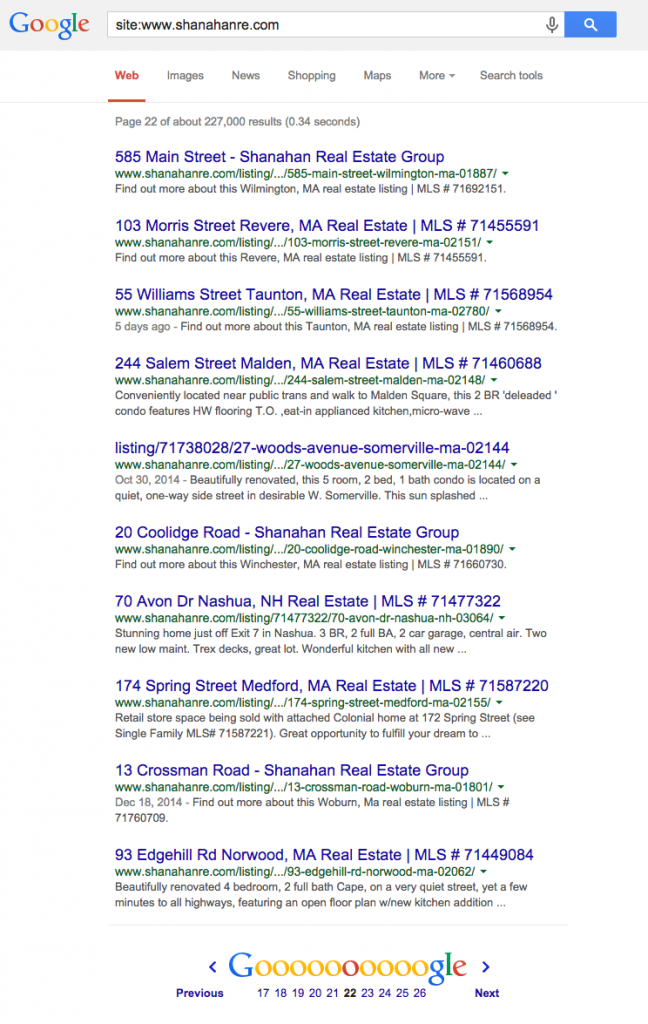Integrated IDX: Why does it matter?
We’ve been talking about the importance of integrated IDX for Realtors since 2008. Six years later, we’re still coming across sites that do not have integrated IDX and prospective clients who do not understand why it’s important. We felt it was time to revisit what integrated IDX is and why it matters so much to your search engine rankings.
Quick refresher: what is IDX?
IDX is short for “Internet Data Exchange,” and it dictates how listings from your local MLS show up on your website. Essentially, IDX lets you, the Realtor, show all of the listings for sale in your market if you agree to let your listings be shown on other Realtor’s websites.
In some markets, there are offices who withhold their listing data. However, participation in the IDX is (nearly) universal. Why? Because the more places a listing is shown, the more likely a potential buyer will see it and the more likely that listing will sell for a higher price. Participating in IDX is the best way to get a listing the exposure it needs to sell at the best price.
How does the IDX appear on a Realtor’s website?
There are two ways to implement the IDX on your real estate website: framed IDX and integrated IDX.
What is framed IDX?
Integrated, framed… what’s the difference? Let’s skip the mumbo jumbo and dig into what’s really important for your real estate website: search engine optimization.
Framed IDX is generally a cheaper solution, but that doesn’t necessarily mean that it’s better. If you use a framed IDX, it appears that you are displaying a page within your website, but it is not actually on yourcompanywebsite.com. Instead, the property search and listing results appear on your idxvendorsite.com and this core functionality is hosted by an outside party.
What does a framed IDX look like?
There are a few ways to tell if your IDX is framed. Check to see if it belongs to a different URL or a subdomain. Does a visitor have to navigate away from your site to see listings? If so, your IDX feed is probably framed.
Another way to tell if your site implements a framed IDX solution is if you have to manage your listings on a separate platform from your site. Do you manage your homepage content on one platform while managing listings on another site? If that’s the case – unless you already know that your IDX vendor provides you an integrated solution – then your IDX feed is probably framed.
What is integrated IDX?
An integrated IDX solution creates crawlable pages for each listing on your site – which could include all of the listings in your MLS. These crawlable pages means that your site has literally thousands of pages that can be seen by major search engines. The more pages you have, the more opportunity you have for your site to rank well in Google and Bing. If done properly (note: not all integrated IDX platforms are created equal), then these crawlable landing pages should contain keywords that are relevant to the market area that your buyers are searching for: keywords like neighborhood name, schools, attractions, etc.
Why does integrated IDX matter?
The more content you have on your site, the more potential customers you can catch. An integrated IDX website allows you website to have thousands of pages indexed by Google and gives you a bigger net to cast out into the internet.
Every Realtor pays their dues to their local MLS. Why not get the full SEO benefit from your membership?
Can you show me an example of an integrated IDX site?
See the screenshot below for a good example. The Shanahan Group is a longtime client of Union Street Media who has seen incredible success from an integrated IDX solution. You’ll notice that the site has around 227,000 pages indexed by Google. These indexed pages include many of the listings in their MLS as well as “recommended searches” that we have set up on their site. Obviously, the vast majority of these pages are the Shanahan Group’s listings. In fact, the indexed pages could even include sold listings.
But – and here’s the important part – Google sees each of these pages as a content page and rewards their site for it.
So… how do I know if my site has integrated IDX?
Run it through our Website Grader for free!



Nice article Ted. Makes perfect sense. I am a web developer in Ohio. My client’s MLS (NORMLS) does not allow agents to integrate IDX into their personal websites, only brokers (i.e. agencies) can us IDX to display the MLS data on their sites from this MLS company. The only way agents using this MLS are permitted to display MLS data for their listings is framed and/or linking back to their broker’s site. Any suggestions on how to work around this?
Like many issues with real estate and the MLS, the solution here is not a technological but political. The Maine Real Estate Information System (MREIS) had a similar rule in place up until 3 years ago: they only allowed up to three agents in the office to have an integrated IDX feed on their site and charged the owner broker $400 a year per agent with an integrated IDX feed. The result? Almost no agent in Maine had their own integrated IDX site. Maine listings were appearing on office sites and Zillow/Trulia, but the agents actually in the field collecting the data that went into the MLS were able to share in the search engine benefits. I would encourage you to petition your MLS to change the regulations.